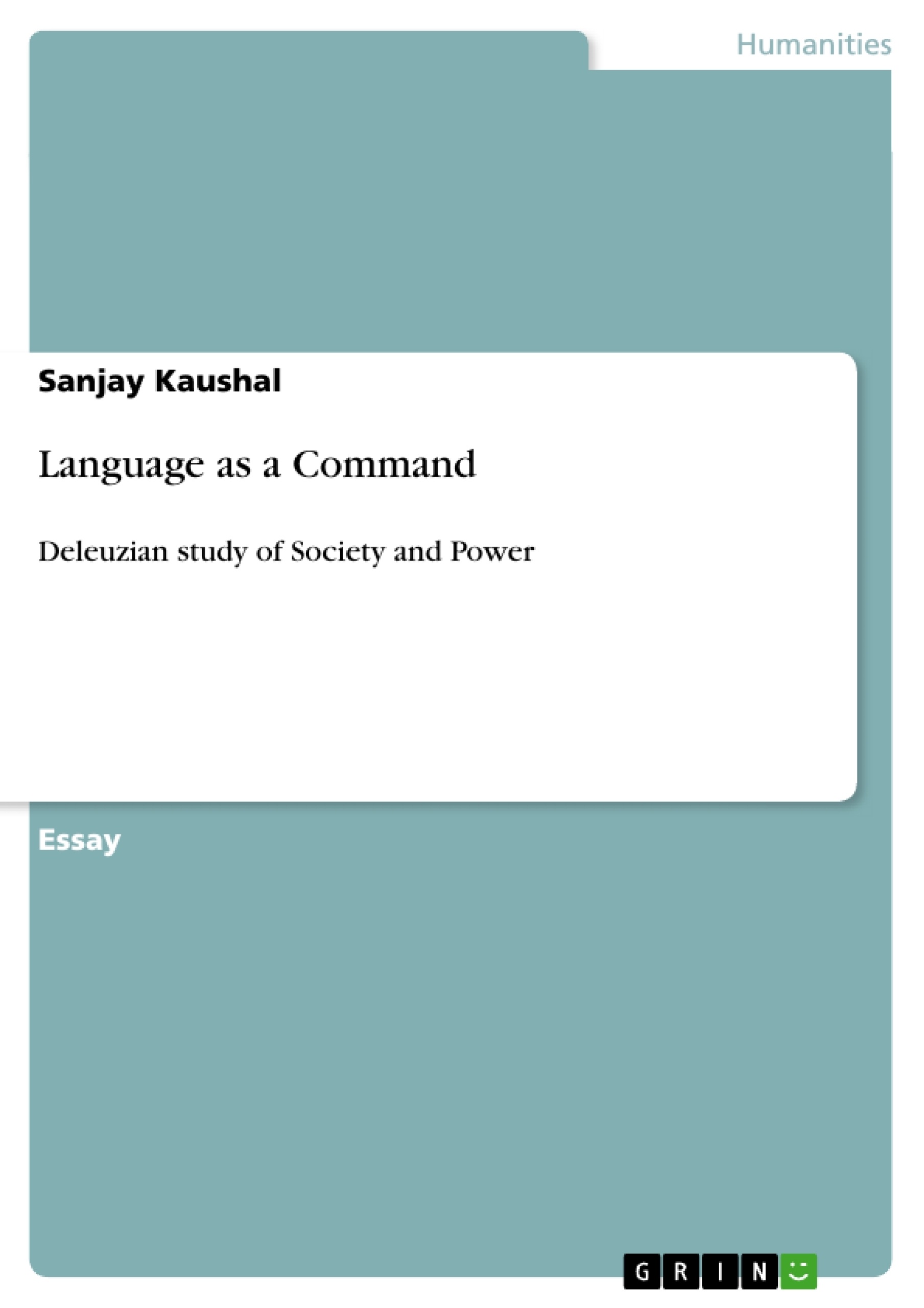The intended idea of this paper is to understand language as a command or the most powerful ideology through which the mechanism of power and subordination is put into practice. Therefore, language cannot be seen as something that can be used by people to ‘share’ or ‘communicate’ their thoughts coherently with the other, for the very idea of ‘sharing’ and ‘communication’ does not bring out the politics of two identical terms – I and you – which are prominent in everyday speech in which ‘being’ is expected to be identified with the features of imposed categories of ‘binary classificatory system’. Consequently, paper goes on to discuss the very inability to experience ‘communication’ in everyday speech, except in literature through writing.
Inhaltsverzeichnis (Table of Contents)
- Language as a Command
- Language and Psychoanalysis
- Deleuze and Language
- The Binary Classificatory System
- Communication and the “I” and “You”
- Communication through Writing
Zielsetzung und Themenschwerpunkte (Objectives and Key Themes)
This paper aims to analyze language as a powerful instrument of control and social order, specifically exploring how language functions as a command rather than a tool for communication or sharing thoughts. The author examines the relationship between language and power, highlighting how language shapes individual identities and maintains social hierarchies.- Language as a command, not communication
- The power of language in shaping social order
- The binary classificatory system and its role in identity formation
- The limitations of everyday speech for authentic communication
- Literature as a form of communication beyond the limitations of everyday speech
Zusammenfassung der Kapitel (Chapter Summaries)
This preview focuses on the main themes, arguments, or narrative elements of each chapter, excluding summaries of the conclusion or any sections containing major revelations or spoilers. The level of detail provided for each chapter is consistent throughout.- Language as a Command: This section analyzes the concept of language as a command, arguing that it is not simply a tool for communication but a force that shapes and controls individuals. The author draws on the ideas of Deleuze and Guattari to demonstrate how language functions as a system of power and control, particularly through the imposition of binary categories and the suppression of authentic communication.
- Language and Psychoanalysis: This section explores the role of language in psychoanalysis, particularly the theories of Freud and Lacan. The author discusses the limitations of these theories, arguing that they focus too narrowly on the family domain and the repression of infantile desire.
- Deleuze and Language: This section delves into Deleuze's concept of language, contrasting it with the psychoanalytic approach. Deleuze argues that language is not simply about repressed desires but about the ways in which social and political power are enacted through language. The author highlights Deleuze's concept of the “order-word,” which functions as a command that compels obedience and shapes behavior.
- The Binary Classificatory System: This section examines how the binary classificatory system, which categorizes individuals into distinct and often opposing groups, operates as a tool of power. The author shows how this system, enforced through language, creates and reinforces social hierarchies and reinforces existing inequalities.
- Communication and the “I” and “You”: This section explores the limitations of everyday speech for authentic communication. The author argues that the use of “I” and “you” in language creates a power dynamic where one speaker becomes dominant and the other is subjected. This dynamic prevents true sharing and communication.
- Communication through Writing: This section examines how literature, through writing, transcends the limitations of everyday speech and offers a form of communication that allows for genuine sharing and transformation. The author highlights the dynamic and fluid nature of communication in literature, where individuals are constantly in flux and evolve in relationship to one another.
Schlüsselwörter (Keywords)
This text explores the multifaceted nature of language as a powerful tool of control, particularly through the lens of Deleuze and Guattari’s theories. Key concepts include the role of language in social order, the binary classificatory system, the limitations of everyday speech for authentic communication, and the transformative potential of literature as a form of communication beyond the limitations of everyday speech. The text examines the relationship between language and power, highlighting how language shapes individual identities and maintains social hierarchies. It focuses on the ways in which language functions as a command, not just a tool for communication or sharing thoughts.Frequently Asked Questions
Why is language described as a "command" in this paper?
Language is seen as a tool of power and social order that imposes categories on individuals, rather than just a neutral medium for sharing thoughts.
What is the "binary classificatory system"?
It is a system enforced through language that categorizes people into opposing groups (like "I" and "you"), reinforcing social hierarchies and inequalities.
How does the author view everyday communication?
The author argues that authentic communication is nearly impossible in everyday speech because of the power dynamics and rigid categories inherent in language.
What role does literature play in this analysis?
Literature, through writing, is seen as a way to transcend the limits of everyday speech, allowing for genuine transformation and fluid communication.
Who are the main theorists mentioned in the text?
The paper draws significantly on the theories of Deleuze and Guattari, as well as psychoanalytic perspectives from Freud and Lacan.
- Quote paper
- Sanjay Kaushal (Author), 2015, Language as a Command, Munich, GRIN Verlag, https://www.grin.com/document/288547



